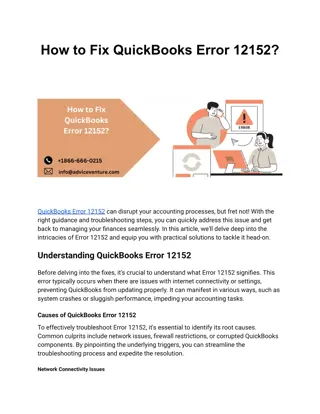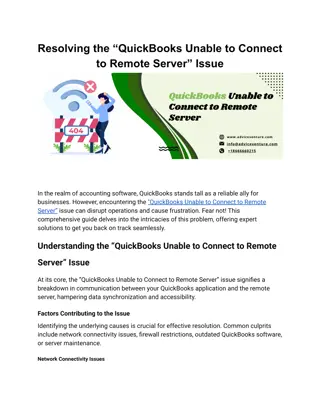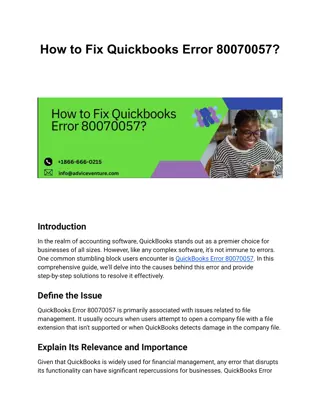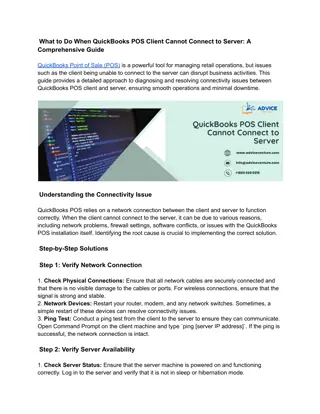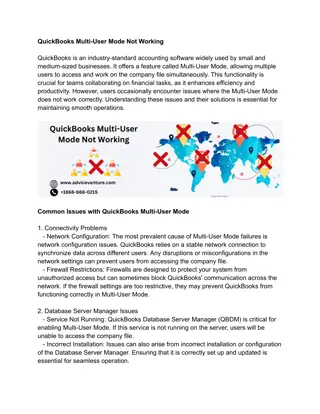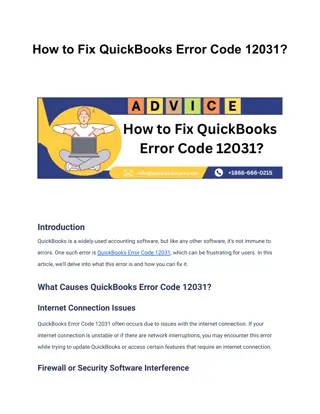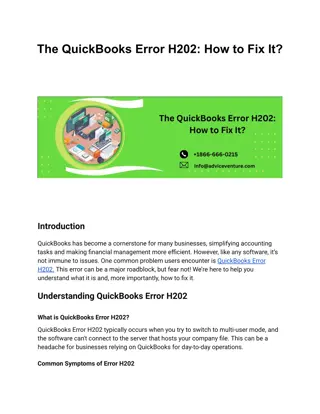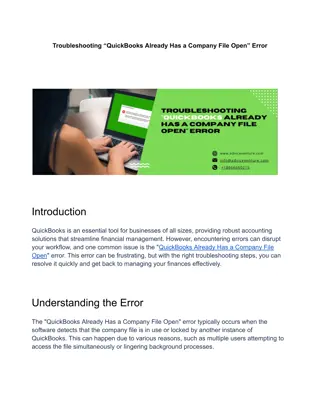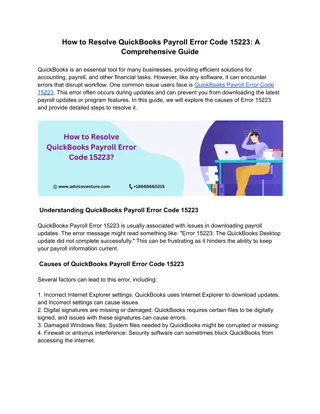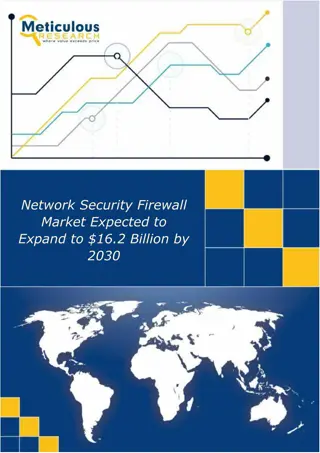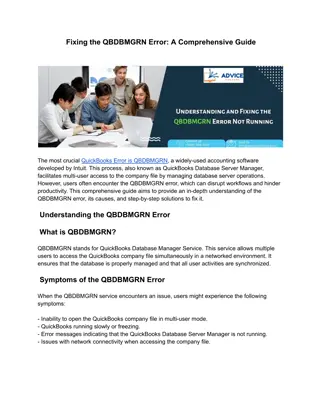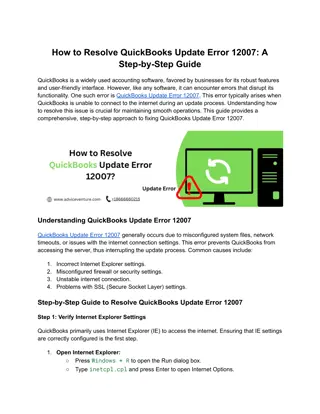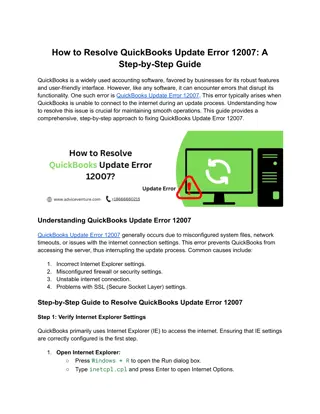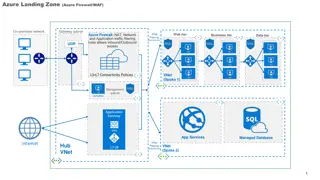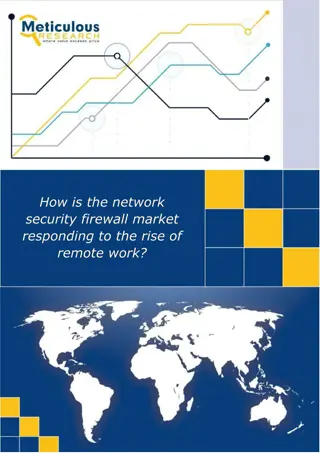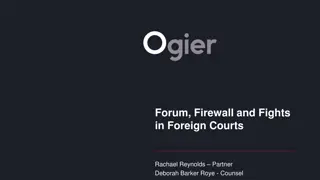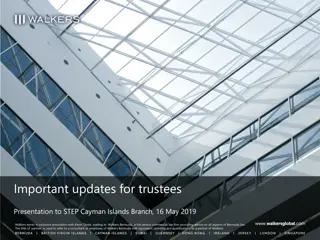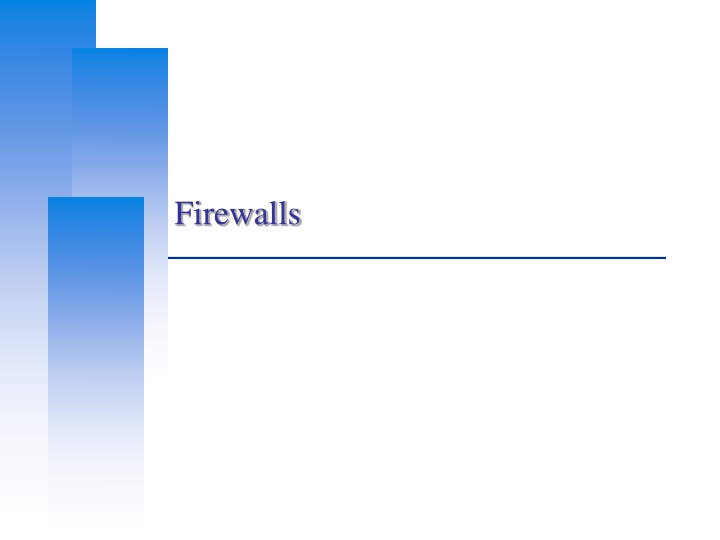
Firewalls and Their Capabilities in Network Security
Learn about firewalls, their role as a choke point between secured and unsecured networks, how they filter incoming and outgoing traffic, and their use in protecting applications and restricting access. Explore different types of firewalls, such as network layer and application layer firewalls, along with the concept of stateful vs. stateless rules. Discover popular firewall packages like iptables in Linux and their importance in enhancing network security.
Download Presentation

Please find below an Image/Link to download the presentation.
The content on the website is provided AS IS for your information and personal use only. It may not be sold, licensed, or shared on other websites without obtaining consent from the author. If you encounter any issues during the download, it is possible that the publisher has removed the file from their server.
You are allowed to download the files provided on this website for personal or commercial use, subject to the condition that they are used lawfully. All files are the property of their respective owners.
The content on the website is provided AS IS for your information and personal use only. It may not be sold, licensed, or shared on other websites without obtaining consent from the author.
E N D
Presentation Transcript
Computer Center, CS, NCTU Firewalls Firewall hardware/software choke point between secured and unsecured network filter incoming and outgoing traffic prevent communications which are forbidden by the security policy What it can be used to do Incoming: protect and insulate the applications, services and machines Such as telnet, NetBIOS Outgoing: limit or disable access from the internal network Such as MSN, ssh, ftp, facebook, SC2, D3 NAT (Network Address Translation) 2
Computer Center, CS, NCTU Firewalls Capabilities Network Layer Firewalls Operate at a low level of TCP/IP stack as IP-packet filters. Filter attributes Source/destination IP Source/destination port TTL Protocols Application Layer Firewalls Work on the application level of the TCP/IP stack. Inspect all packets for improper content, a complex work! Application Firewalls The access control implemented by applications. TCP Wrapper (libwrap) 3
Computer Center, CS, NCTU Firewalls Rules Exclusive Inclusive Only block the traffic matching the rulesets Only allow the traffic matching the rulesets Offer much better control of the incoming/outgoing traffic Safer than exclusive one (Y) reduce the risk of allowing unwanted traffic to pass (N) increase the risk to block yourself with wrong configuration State Stateful Keep track of which connections are opened through the firewall Be vulnerable to Denial of Service (DoS) attacks Stateless 4
Computer Center, CS, NCTU Firewalls Packages Linux iptables (kernel 2.4+) ipchains (kernel < 2.4) Firewalld ufw FreeBSD IPFILTER (known as IPF) IPFIREWALL (known as IPFW) + Dummynet Packet Filter (known as PF)+ ALTQ migrated from OpenBSD v4.5 (In FreeBSD 9.0) http://www.openbsd.org/faq/pf/ v5.0 5
Computer Center, CS, NCTU iptables User-space software that control Linux kernel firewall Control Linux kernel Netfilter modules Support kernel version 2.4+ Replace ipchains and ipfwadm iptables allows system administrators to define tables containing chains of rules for the treatment of packets 7
Computer Center, CS, NCTU Packet flow in Netfilter 8
Computer Center, CS, NCTU Xtables Architecture Xtables v4, v6, arp, eb IPv4, IPv6 are different tables Tables filter, nat, mangle Chains PREROUTING, OUTPUT, FORWARD, INPUT, POSTROUTING Rules e.g., iptables -A INPUT -i lo -j ACCEPT 9
Computer Center, CS, NCTU Xtables Architecture Filter Filter Table The default table of iptables command For packets filter INPUT Packets that come in (to local) OUTPUT Packets that go out (from local) FORWARD Packets that pass through (from others to others) 10
Computer Center, CS, NCTU Xtables Architecture NAT NAT tables For IP masquerade PREROUTING Packets that will go into the routing tables POSTROUTING Packets that have left the routing tables OUTPUT Packets that go out (from local) 11
Computer Center, CS, NCTU Xtables Architecture Mangle Mangle Table For special purpose, e.g., add or remove some special tags from packets PREROUTING OUTPUT FORWARD INPUT POSTROUTING 12
Computer Center, CS, NCTU iptables Flowchart 13
Computer Center, CS, NCTU iptables List iptables -t tables : Target table -L : List all rules -n : Don t lookup domain names -v : Show details 14
Computer Center, CS, NCTU iptables Init iptables -F : Flush all rules -X : Flush all custom chains -Z : Flush all statistics data for all chains iptables -P [INPUT,OUTPUT,FORWARD] [ACCEPT, DROP] Change the default policy of the target chain 15
Computer Center, CS, NCTU iptables Save and Restore iptables-restore Restore from restore file iptables-save Export all rules and generate restore file Some system will load restore file at boot Ex: CentOS /etc/sysconfig/iptables /etc/sysconfig/ip6tables Restore file syntax # comments * table name : chain default-policy [pkt:byte] Rules COMMIT (End of file) 16
Computer Center, CS, NCTU iptables Module User may need special rule to filter packets Split several feature into different module Stateful Packets states tracking Traffic statistics Use -m to access module iptables -A INPUT -m conntrack iptables -A INPUT -m recent http://ipset.netfilter.org/iptables-extensions.man.html 17
Computer Center, CS, NCTU iptables Rules (1/2) Modify -A, --append -C, --check -D, --delete -I, --insert -R, --replace Jump -j, --jump To user-defined chain ACCEPT, DROP, REJECT, RETURN, SNAT, DNAT, MASQUERADE -g, --goto Unlike the --jump option return will not continue processing in this chain but instead in the chain that called us via --jump. 18
Computer Center, CS, NCTU iptables Rules (2/2) Filter -i, -o [if] : incoming interface / outgoing interface -i ens192 -o docker0 -s, -d [net] : Source / Destination -s 192.168.0.1/24 d 140.113.1.1 --sport, --dport [port] : Source port / Destination port --sport 22 --dport 80 -p [protocol] : tcp, udp, icmp, all -p icmp ! (not) : Invert matching ! -s 140.113.1.0/24 ! -i eth0 ! -p udp 19
Computer Center, CS, NCTU iptables Custom chain Create -N my-chain Define in restore file When iptables reaches the end of user-defined chain, flow returns to the next rule in the calling chain Ex -A INPUT -j badguy -A INPUT -j ACCEPT -A badguy -s 1.2.3.4 -j DROP -A badguy -s 140.112.0.0/24 -j DROP 20
Computer Center, CS, NCTU Example: Hello world Allow outgoing packets but deny all incoming packets, except the packets that reply users requests -A INPUT -i lo -j ACCEPT -A INPUT -m conntrack --ctstate RELATED,ESTABLISHED -j ACCEPT State NEW : New connection ESTABLISHED : Old connection RELATED : New connection create by ESTABLISHED session INVALID 21
Computer Center, CS, NCTU Example: NAT Provides NAT from eth0 to eth1 sysctl -w net.ipv4.ip_forward=1 -t NAT -A POSTROUTING -i eth0 -o eth1 -j MASQUERADE Nat SNAT --to-source : Change Source IP Address DNAT --to-destination : Change Destination IP Address MASQUERADE : Change Source IP Address (based on outgoing device IP Address) 22
Computer Center, CS, NCTU Example: Prevent DDoS Attack Append traffic limit (10 times / 60 sec) to SSH services -A INPUT -p tcp --dport 22 -m state --state NEW -m recent --set -- name RECENT --rsource -A INPUT -p tcp --dport 22 -m state --state NEW -m recent --rcheck --seconds 60 --hitcount 10 --name RECENT --rsource -j DROP xt_recent Record every connection Filter connection by connecting history 23
Computer Center, CS, NCTU Other tools These tools help user to manage iptables rules UFW (Uncomplicated Firewall) (Ubuntu) Easy to use Hard to customize Firewalld (Redhat) Another way to manage your firewall Sometime even with these tools, you still need to understand iptables, otherwise you cannot manage complicated firewall rules like docker network, kubernetes 24
Computer Center, CS, NCTU Packet Filter (PF) Functionality Filtering packets NAT Load balance QoS: (ALTQ: Alternate Queuing) Failover (pfsync + carp) 26
Computer Center, CS, NCTU PF in FreeBSD Enable pf* In /etc/rc.conf (kernel modules loaded automatically) pf_enable="YES" pflog_enable="YES" pfsync_enable="YES" Kernel configurations device pf device pflog device pfsync 27
Computer Center, CS, NCTU PF in FreeBSD Commands /etc/rc.d/pf start / stop / restart / status / check / reload / resync pfctl -e / -d -F {nat | rules | state | info | Tables | all | } -v -s {nat | rules | state | info | all | Anchors | Tables | } -v -n -f /etc/pf.conf -t <table> -T {add | delete| test} {ip } -t <table> -T {show | kill | flush | } -k {host | network} [-k {host | network}] -a {anchor} Default anchor: -a '*' Ex. -a ftp-proxy/* 28
Computer Center, CS, NCTU PF in FreeBSD Config ordering Macros Tables Options Normalization reassemble fragments and resolve or reduce traffic ambiguities. Queueing altq , queue rule-based bandwidth control. Translation (NAT) rdr , nat , binat specify how addresses are to be mapped or redirected to other addresses First match rules Filtering antispoof , block , pass rule-based blocking or passing packets Last match rules user-defined variables, so they can be referenced and changed easily. table similar to macros, but efficient and more flexible for many addresses. set tune the behavior of pf, default values are given. scrub 29
Computer Center, CS, NCTU PF in FreeBSD Lists Lists Allow the specification of multiple similar criteria within a rule multiple protocols, port numbers, addresses, etc. defined by specifying items within { } brackets. eg. pass out on rl0 proto { tcp, udp } from { 192.168.0.1, 10.5.32.6 } to any pass in on fxp0 proto tcp to port { 22 80 } Pitfall pass in on fxp0 from { 10.0.0.0/8, !10.1.2.3 } You mean (It means) 1. pass in on fxp0 from 10.0.0.0/8 2. block in on fxp0 from 10.1.2.3 2. pass in on fxp0 from !10.1.2.3 Use table, instead. 30
Computer Center, CS, NCTU PF in FreeBSD Macros Macros user-defined variables that can hold IP addresses, port numbers, interface names, etc. reduce the complexity of a pf ruleset and also make maintaining a ruleset much easier. Naming: start with [a-zA-Z] and may contain [a-zA-Z0-9_] eg. ext_if = "fxp0 block in on $ext_if from any to any Macro of macros host1 = "192.168.1.1 host2 = "192.168.1.2 all_hosts = "{" $host1 $host2 "}" 31
Computer Center, CS, NCTU PF in FreeBSD Tables (1) Tables used to hold a group of IPv4 and/or IPv6 addresses hostname, inteface name, and keyword self Lookups against a table are very fast and consume less memory and processor time than lists Two attributes persist: keep the table in memory even when no rules refer to it const: cannot be changed once the table is created eg. table <private> const { 10/8, 172.16/12, 192.168/16 } table <badhosts> persist block on fxp0 from { <private>, <badhosts> } to any table <spam> persist file "/etc/spammers" file "/etc/openrelays" 32
Computer Center, CS, NCTU PF in FreeBSD Tables (2) Tables Address Matching An address lookup against a table will return the most narrowly matching entry eg. table <goodguys> { 172.16.0.0/16, !172.16.1.0/24, 172.16.1.100 } block in on dc0 pass in on dc0 from <goodguys> Result 172.16.50.5 passed 172.16.1.25 blocked 172.16.1.100 passed 10.1.4.55 blocked 33
Computer Center, CS, NCTU PF in FreeBSD Options Format control pf's operation, and specified in pf.conf using set Format: set option [sub-ops] value Options loginterface collect packets and gather byte count statistics ruleset-optimization ruleset optimizer none, basic, profile basic: remove dups, remove subs, combine into a table, re-order rules block-policy default behavior for blocked packets drop, return skip on {ifname} interfaces for which packets should not be filtered. eg. set skip on lo0 timeout, limit, optimization, state-policy, hostid, require-order, fingerprints, debug 34
Computer Center, CS, NCTU PF in FreeBSD Normalization Traffic Normalization IP fragment reassembly scrub in all Default behavior Fragments are buffered until they form a complete packet, and only the completed packet is passed on to the filter. Advantage: filter rules have to deal only with complete packets, and ignore fragments. Disadvantage: caching fragments is the additional memory cost The full reassembly method is the only method that currently works with NAT. 35
Computer Center, CS, NCTU PF in FreeBSD Translation (1) Translation Modify either the source or destination address of the packets The translation engine 1. modifies the specified address and/or port in the packet 2. passes it to the packet filter for evaluation Filter rules filter based on the translated address and port number Packets passed directly if the pass modifier is given in the rule 36
Computer Center, CS, NCTU PF in FreeBSD Translation (2) Various types of translation binat bidirectional mapping between an external IP netblock and an internal IP netblock binat on $ext_if from 10.1.2.150 to any -> 140.113.235.123 binat on $ext_if from 192.168.1.0/28 to any -> 140.113.24.0/28 nat IP addresses are to be changes as the packet traverses the given interface no nat on $ext_if from 192.168.123.234 to any nat pass on $ext_if from 192.168.123.0/24 to any -> 140.113.235.21 rdr redirect packets to another destination and possibly different port no rdr on $int_if proto tcp from any to $server port 80 rdr on $int_if proto tcp from any to any port 80 -> 127.0.0.1 port 80 37
Computer Center, CS, NCTU PF in FreeBSD Translation (3) Evaluation Evaluation order of translation rules depends on the type binat rules first, and then either rdr rules for inbound packets or nat rules for outbound packets Rules of the same type are evaluated in the order of appearing in the ruleset The first matching rule decides what action is taken If no rule matches the packet, it is passed to the filter unmodified 38
Computer Center, CS, NCTU PF in FreeBSD Packet Filtering (1) pf has the ability to block and pass packets based on layer 3(ip, ip6) and layer 4(icmp, icmp6, tcp, udp) headers Each packet processed by the filter The filter rules are evaluated in sequential order The last matching rule decides what action is taken If no rule matches the packet, the default action is to pass Format {pass | block [drop | return]} [in | out] [log] [quick] [on ifname] {hosts} The simplest to block everything by default: specify the first filter rule block all 39
Computer Center, CS, NCTU PF in FreeBSD Packet Filtering (2) States If the packet is passed, state is created unless the no state is specified The first time a packet matches pass, a state entry is created For subsequent packets, the filter checks whether each matches any state For TCP, also check its sequence numbers pf knows how to match ICMP replies to states Port unreachable for UDP ICMP echo reply for echo request Stores in BST for efficiency 40
Computer Center, CS, NCTU PF in FreeBSD Packet Filtering (3) Parameters in | out apply to imcoming or outgoing packets log - generate log messages to pflog (pflog0, /var/log/pflog) Default: the packet that establishes the state is logged quick the rule is considered the last matching rule on ifname apply only on the particular interface inet | inet6 apply only on this address family proto {tcp | udp | icmp | icmp6} apply only on this protocol 41
Computer Center, CS, NCTU PF in FreeBSD Packet Filtering (4) Parameters hosts : { from host [ port [op] # ] to host [port [op] #] | all } host: host can be specified in CIDR notation, hostnames, interface names, table, or keywords any, self, Hostnames are translated to address(es) at ruleset load time. When the address of an interface or hostname changes, the ruleset must be reloaded When interface name is surrounded by (), the rule is automatically updated whenever the interface changes its address port: ops: unary(=, !=, <, <=, >, >=), and binary(:, ><, <>) eg. block in all pass in proto tcp from any port < 1024 to self port 33333:44444 42
Computer Center, CS, NCTU PF in FreeBSD Packet Filtering (5) Parameters flags {<a>/<b> | any} only apply to TCP packets Flags: (F)IN, (S)YN, (R)ST, (P)USH, (A)CK, (U)RG, (E)CE, C(W)R Check flags listed in <b>, and see if the flags (not) in <a> is (not) set eg. flags S/S : check SYN is set, ignore others. flags S/SA: check SYN is set and ACK is unset., ignore others Default flags S/SA for TCP icmp-type type code code icmp6-type type code code Apply to ICMP and ICMP6 packets label for per-rule statistics {tag | tagged} string tag by nat, rdr, or binat, and identify by filter rules. 43
Computer Center, CS, NCTU PF in FreeBSD Load Balance Load balance For nat and rdr rules eg. rdr on $ext_if proto tcp from any to any port 80 \ -> {10.1.2.155, 10.1.2.160, 10.1.2.161} round-robin 44
Computer Center, CS, NCTU PF in FreeBSD Security For security consideration state modulation Create a high quality random sequence number Applying modulate state parameter to a TCP connection syn proxy pf itself completes the handshake Applying synproxy state parameter to a TCP connection Include modulate state 45
Computer Center, CS, NCTU PF in FreeBSD Stateful tracking Stateful tracking options keep state, modulate state, and synproxy state support these options keep state must be specidied explicitly to apply options to a rule eg. table <bad_hosts> persist block quick from <bad_hosts> pass in on $ext_if proto tcp to ($ext_if) port ssh keep state \ ( max-src-conn-rate 5/30, overload <bad_hosts> flush global) 46
Computer Center, CS, NCTU PF in FreeBSD Blocking spoofed Blocking spoofed traffic antispoof for ifname antispoof for lo0 block drop in on ! lo0 inet from 127.0.0.1/8 to any block drop in on ! lo0 inet6 from ::1 to any antispoof for wi0 inet (IP: 10.0.0.1, netmask 255.255.255.0) block drop in on ! wi0 inet from 10.0.0.0/24 to any block drop in inet from 10.0.0.1 to any Pitfall: Rules created by the antispoof interfere with packets sent over loopback interfaces to local addresses. One should pass these explicitly. set skip on lo0 47
Computer Center, CS, NCTU PF in FreeBSD Anchors Besides the main ruleset, pf can load rulesets into anchor attachment points An anchor is a container that can hold rules, address tables, and other anchors The main ruleset is actually the default anchor An anchor can reference another anchor attachment point using nat-anchor rdr-anchor binat-anchor anchor load anchor <name> from <file> 48
Computer Center, CS, NCTU PF in FreeBSD Example Ex. # macro definitions extdev='fxp0 server_ext= 140.113.214.13 # options set limit { states 10000, frags 5000 } set loginterface $extdev set block-policy drop set skip on lo0 # tables table <badhosts> persist file /etc/badhosts.list # filtering rules block in all pass out all antispoof for $extdev block log in on $extdev proto tcp from any to any port {139, 445} block log in on $extdev proto udp from any to any port {137, 138} block on $extdev quick from <badhosts> to any pass in on $extdev proto tcp from 140.113.0.0/16 to any port {139, 445} pass in on $extdev proto udp from 140.113.0.0/16 to any port {137, 138} 49
Computer Center, CS, NCTU PF in FreeBSD Debug by pflog Enable pflog in /etc/rc.conf (pflog.ko loaded automatically) pflog_enable="YES" Log to pflog0 interface tcpdump -i pflog0 pflog_logfile="/var/log/pflog" tcpdump -r /var/log/pflog Create firewall rules Default configuration rules pf_rules="/etc/pf.conf" Sample files /usr/share/examples/pf/* 50


